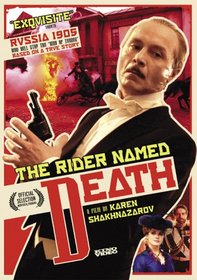| Actors: Andrey Panin, Kseniya Rappoport, Artyom Semakin, Rostislav Bershauer, Anastasiya Makeyeva Director: Karen Shakhnazarov Creators: Vladimir Klimov, Aleksandr Borodyanskiy, Boris Savinkov Genres: Indie & Art House, Drama Sub-Genres: Indie & Art House, Drama Studio: KINO INTERNATIONAL Format: DVD - Color - Closed-captioned,Subtitled DVD Release Date: 08/02/2005 Release Year: 2005 Run Time: 1hr 46min Screens: Color Number of Discs: 1 SwapaDVD Credits: 1 Total Copies: 0 Members Wishing: 3 MPAA Rating: Unrated Languages: French, Russian Subtitles: English |
Search - The Rider Named Death on DVD
  | The Rider Named Death Actors: Andrey Panin, Kseniya Rappoport, Artyom Semakin, Rostislav Bershauer, Anastasiya Makeyeva Director: Karen Shakhnazarov Genres: Indie & Art House, Drama UR 2005 1hr 46min |
Larger Image |
Movie Details
We're sorry, our database doesn't have DVD description information for this item. Click here to check Amazon's database -- you can return to this page by closing the new browser tab/window if you want to obtain the DVD from SwapaDVD.
Click here to submit a DVD description for approval.
Similar Movies
|
Movie ReviewsA unique and timeless examination of the psychology of terro John Morgan | Ann Arbor, Michigan | 01/30/2007 (5 out of 5 stars) "This film is closely based on a book that was originally published pseudonymously by Boris Savinkov a century ago, but despite the fact that Savinkov is virtually unknown in the West outside of the world of professional history (it's worth mentioning that he was portrayed as a major character in the largely inaccurate 1980s BBC series "Reilly: The Ace of Spies"), his life and writings should be better known as a testimony to a very pertinent aspect of present-day living: terrorism. Savinkov devoted his entire life to the cause of terrorism, at first giving his services to the cause of revolution in turn-of-the-century Imperial Russia as a Social Revolutionary, and then later, after 1917, to the cause of counter-revolution against the Bolsheviks until his capture and death at their hands in 1925. He left behind an extensive body of writings detailing his experiences as a terrorist, four works of which were translated into English: a book of memoirs, Memoirs of a Terrorist; The Pale Horse (upon which this film is based); The Black Horse; and What Never Happened: A Novel of the Revolution. All of these works should be studied by anyone interested in obtaining a unique look into the soul and psyche of a terrorist. "The Pale Horse" was written at a mid-point in Savinkov's career, after many of his notorious assassinations in the cause of socialist revolution, but before his later counter-revolutionary identity emerged. Although the book and the film present themselves as fiction, the incident portrayed is based on an assassination which Savinkov actually carried out in 1905. However, "The Pale Horse," and as a result this film, is far from being a justification of his lethal actions in the cause of revolution. It is instead a meditation on the contradiction with which every terrorist must come to terms in the pursuit of his trade: the constant deviation between the sense of nihilism that lies behind any act which seeks to turn random murder (although Savinkov's assassinations are directed against specific targets in the Czarist aristocracy, many innocents die in the bombings as well) into a political symbol, and the resulting need for fanatical hate that is the only force that can drive his conscience to carry out such deeds. Savinkov's stories, and as a result this film, deserve to be considered as art, as despite his intimate involvement in the actions he is describing, he manages to maintain a metaphysical point of view that is exterior to them. This enables the viewer to arrive at his own conclusions about the killings that are portrayed. Additionally, this film does a brilliant job of recreating the sense of the novel, as well as the world of late Imperial Russia itself, although the dilemma with which it deals is as timeless as politically motivated violence itself. And even for those who have read the novel, the filmmakers give an interesting twist to the ending, based on the facts of Savinkov's later life, which adds an extra layer of meaning in light of what we know about Savinkov's death and political goals a century later."
|





